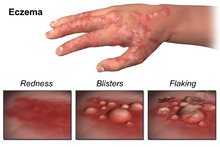[]
What is Eczema?[]
Eczema is a condition that forms rough, dry patches of skin that get inflamed, causing blisters that itch and bleed. Eczema refers to a chronic inflammatory skin condition. There is no real external cause but, it is believed to develop due to a combination of hereditary and environmental factors. Eczema affects 10% to 20% of infants and you about 3% of adults and children in the U.S. Most infants that get it, overgrew it when there 10 years old. And some people have it on and off during there life.

How does Eczema Affect the Integumentary System?[]
The Integumentary system works to waterproof, cushion, regulate body temperature and protect the body from infection. Eczema Affects the integumentary system because it irritates the skin.
Eczema affects the integumentary system by exposing your body to harmful bacteria. Once the blisters are open, bacteria that is normally kept outside of our bodies, thanks to our skin, is now brought inside our bodies which can cause more harm to our skin and maybe other parts of our body.
Signs and Symptoms[]
There are many signs and symptoms of eczema such as rashes. The first sign that eczema is present is irritation and itchiness which can come before the rash which later leads to a red rash. Eczema can be commonly found on hands, feet, knees, wrists or even the face. If there is continued itchiness and a rash appears, this is most likely eczema. The next signs and symptoms of eczema are bleeding and shedding of the skin. After continuous itching, bleeding may occur and the skin will start to shed. Other signs of eczema are swelling. If your skin turns redish or purpleish you can be getting eczema. Another sign of eczema are recurring rashes. If the rash keeps on coming back then its most likely eczema.
Eczema can be mild, moderate, or severe. People with eczema usually suffer from dry, sensitive skin. Eczema also comes with an intense itch, it can excel to the point where it is so bad that if you scratch your skin to often, your skin might bleed.
Diagnosis[]
To confirm a eczema diagnosis the doctor may ask if you have a history of asthma or allergic reaction, if you have any recent stress and if you have any substances that could irritate the skin.
The way that eczema is diagnosed is a pediatrician or dermatologist can look at the affected area of the skin and determine whether or not it is eczema or not. There are no tests to tell if eczema is present, but doctors my ask the patient a few questions, and look at the skin to determine whether or not it is eczema.
You may want to see a dermatologist to confirm that these are signs of eczema, history of asthma or allergic reactions, substances that irritate the skin, any recent extra stress, where and when the symptoms appear, and any other treatment used for other skin conditions.

Treatment[]
The way that eczema is treated is by using lotions or creams. The best time to apply the lotion is after the skin is damp like after a shower, so that the lotion can contain the moisture. Some doctors can give a prescription lotion that is used to help lessen the inflammation, meanwhile the goal of a normal lotion found in stores is used to help stop the itching. If the itching and inflammation becomes extreme, tar is used to help stop the itching and inflammation. The main goal of all the lotions is also to help stop itching, as itching can cause an infection in the skin.
Some treatment for eczema include emollients, topical steroids, atopic eczema, contact dermatitis, and adult seborrheic dermatitis.
http://www.webmd.com/skin-problems-and-treatments/guide/atopic-dermatitis-eczema